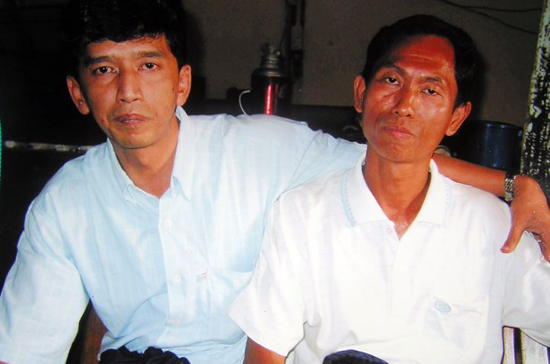
Simon Scott and Naing Ko Ko
ANALYSIS: For a long time, it was easy for us to hold an opinion on Burma. It fitted neatly into the classic dichotomy of good and evil. The regime – made up of cruel, despotic military generals – was bad, and Aung San Suu Kyi and the huddled masses of Burmese people she led were good.
The country seemed like an iron-clad monolith to the durability of repression – a case study in how totalitarianism and suffering could continue despite the odds.
When Suu Kyi was released from house arrest in late 2010 there was much cause for celebration, yet we remained sceptical.
Surely it was just another grand, symbolic gesture orchestrated by the generals to placate the growing chorus of criticism outside the country, before returning to business as usual?
Yet to our surprise, the process of reform continued and began to build a momentum of its own.
Could the new Thein Sein government really be a different entity from the old regime? Could real and irreversible change be occurring in a country where it once seemed little more than a pipe dream?
Last Friday’s mass release of political prisoners may well go down in history as the point in time when people started to believe real change in Burma was not just possible, but actually happening.
It is significant, not just because of the large number of political prisoners involved – 651 at latest count – but also because of who was released. The freeing of Min Ko Naing, Ko Ko Gyi, Htay Kywe, Mya Aye and other key figures from the “8888 Uprising” is in many ways as significant as the release of Suu Kyi herself.
Serious challenge
The “8888 Uprising” – so named because it started on the August 8, 1988 – was the most serious challenge to the generals’ power in living memory, and democracy activists such as Min Ko Naing were the architects and leaders of that challenge.
Yet history warns us not to jump the gun and praise Burma’s rulers quite yet. Many of the activists released on Friday were also freed in 2004 or 2005 and then arrested again in 2007.
Min Ko Naing, who was one of them, headed the All Burma Federation of Student Unions in 1988 and is probably Burma’s best-known opposition leader after Suu Kyi. He was previously released from prison on the eve of a debate on Burma at the United Nations Security Council where a resolution on human rights abuses in the country was being proposed
Thus Burma’s rulers have long been in the habit of using political prisoners as bargaining chips to gain concessions from Western governments, and this is clearly the strategy of the current government.
Yet this time things are happening on an unprecedented scale. Previous amnesties for political prisoners, such as the one in May last year, for example, saw only 55 such inmates released alongside thousands of regular convicts.
The recent concessions from Western governments have also been larger, more tangible and come faster than ever before.
Shortly after Friday’s prisoner release, quid pro quo Washington announced ambassadors would be exchanged between the two countries, signalling the re-establishment of formal diplomatic relations for the first time since 1988.
Heavyweight visitors
Since March last year, a constant stream of prime ministers, foreign ministers, trade ministers, MPs, senators and other emissaries, from Tokyo to Oslo, including international heavyweights such as US Secretary of State Hillary Clinton and British Foreign Minister William Hague, have made the pilgrimage to Naypyidaw.
Alongside them, delegations of global financial investors and business executives have also been flocking to Burma to conduct market research and explore potential business opportunities. Hedge fund billionaire George Soros announced he will open an office for his philanthropic mission in the country after he met Aung San Suu Kyi this month.
Japanese Trade Minister Yukio Edano travelled to Rangoon last week with a delegation of officials from top Japanese companies such as Hitachi, Toshiba, Mitsui and JX Nippon Oil & Energy.
Without doubt Burma is opening up to the world, but what is the hidden agenda motivating the country’s rulers to open the iron gates? Are the people able to freely get involved in the political process that is creating the changes in their country?
So far, the former generals are still playing a largely unilateral game, where they dominate and control every step along the way towards building a new Burma.
Economic liberalisation without political emancipation is no victory for the Burmese people.
For a former military general, President Thein Sein is clearly a moderate and may well prove to be a decent human being, but in order to continue carrying out his reformist programme he ultimately needs to retain the backing of the army and its commander-in-chief, General Min Aung Hlaing, a man who has a reputation as a hardliner.
Massive victory
In the after-glow of such a massive victory for human rights in Burma, it is critical that we do not forget the hundreds of political prisoners – by some accounts more than 600 – who remain in captivity, living in harsh and inhumane conditions.
In addition, the crooked laws and legal processes that made the imprisonment of political prisoners possible in the first place remain unchanged.
For Burma to call itself a democracy, it must go beyond releasing its political prisoners – it must become a society where there is no risk that political prisoners will be taken in the future. A country where speaking out against the government is not a crime, but a right.
Naing Ko Ko was a recipient of the 2010 Amnesty International New Zealand Human Rights Defender Award and is a former Burmese political prisoner. Simon Scott is a Tokyo-based journalist who writes on Japan and Burma-related issues. This article was originally in the New Zealand Herald but has been republished by Pacific Scoop with permission from the authors.



